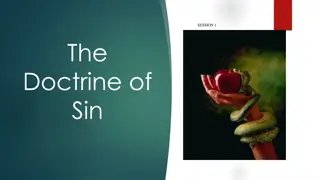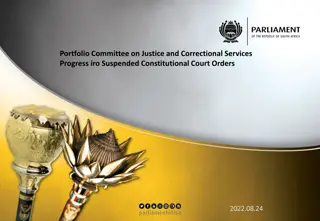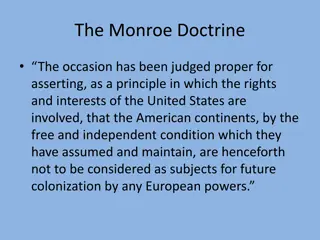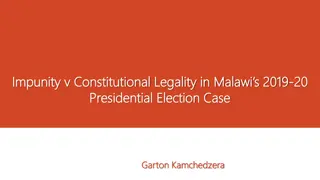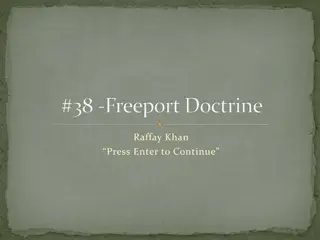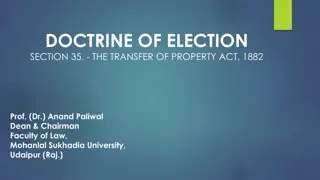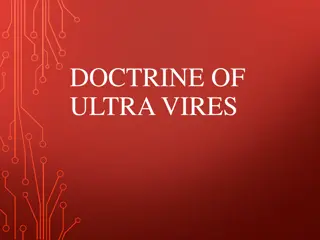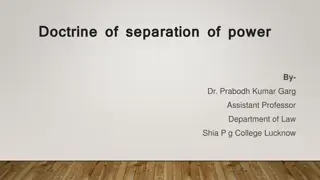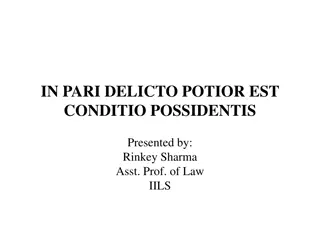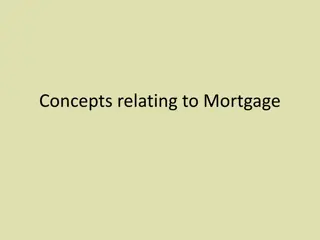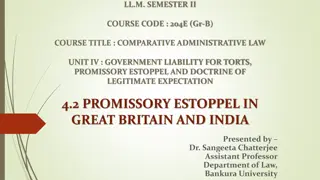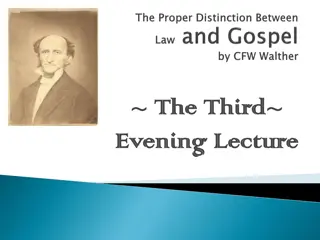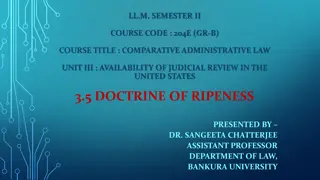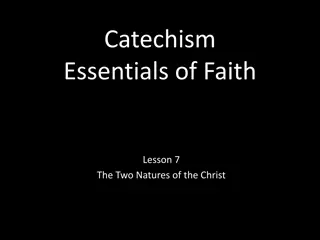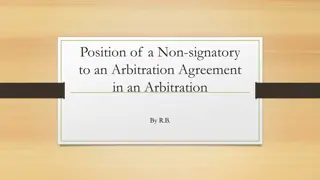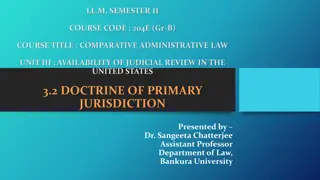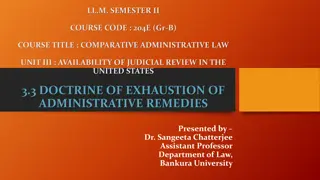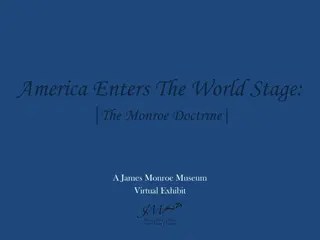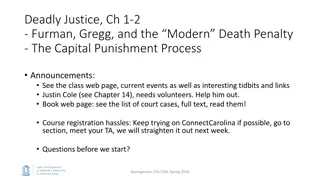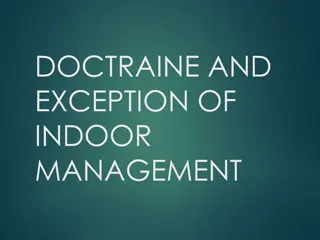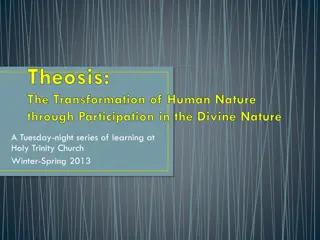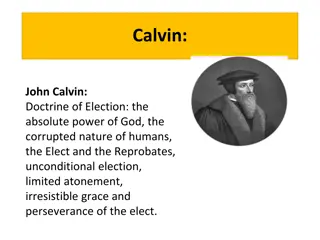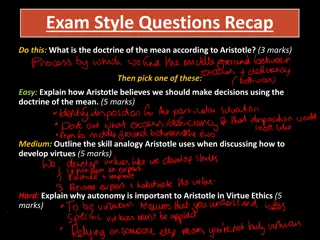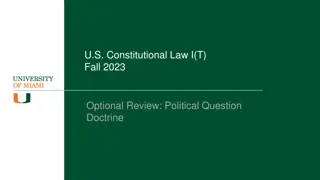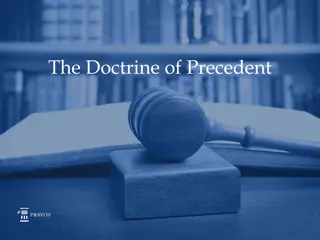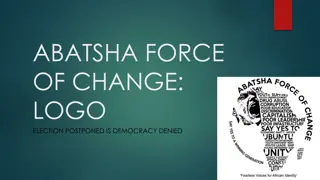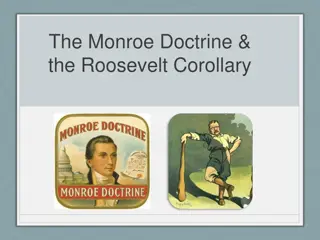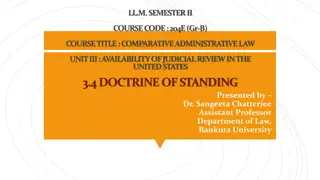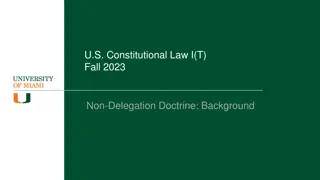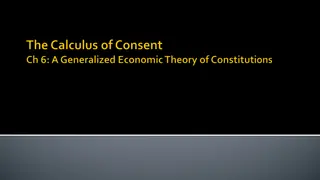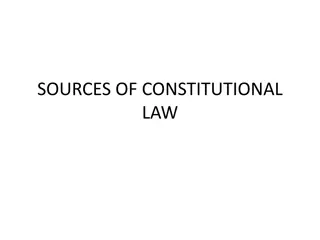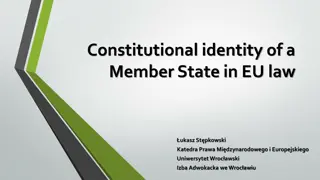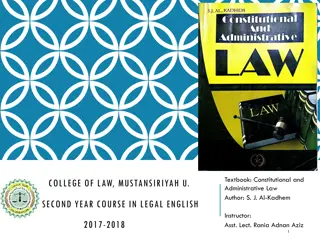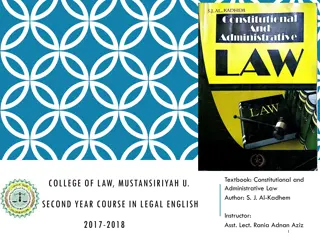Challenges of Constitutional Reform in Nigeria: A Comprehensive Analysis
Delve into the complexities of Nigeria's constitutional reform efforts since the Fourth Republic began in 1999. Explore the structural, institutional, and historical drivers of constitutional conflict, from a deeply divided society to issues of federalism and ethnic autonomy. Assess the challenges a
0 views • 35 slides
Constitutional Court judgments with suspended orders.
The Constitutional Court in South Africa has issued judgments with suspended orders in various cases relating to Acts that were deemed inconsistent with the Constitution. Orders in cases like the Riotous Assemblies Act and Drugs and Drug Trafficking Act are set to lapse on specific dates unless the
4 views • 44 slides
Understanding the Doctrine of Sin in Christian Theology
Explore the profound impact of sin as a transgression against God's holiness, its existence, extent, consequences, and common misunderstandings. Delve into biblical references on sin's definition and the origin of evil in the world. Gain insight into the significance of doctrine in aligning beliefs
1 views • 18 slides
Understanding the Constitutional Background of Sparrow Case
Providing a comprehensive contextual understanding of the Sparrow case is crucial beyond just teaching the basic interpretive framework. The historical background of Sparrow, rooted in colonial imperialism and Indigenous sovereignty, shapes the constitutional rationale behind the interpretation of s
0 views • 10 slides
Progress Report on Suspended Constitutional Court Orders - Portfolio Committee Update
Progress report on suspended Constitutional Court orders related to various cases such as Minister of Justice and Constitutional Development v. Prince, Sonke Gender Justice NPC v. President of South Africa, and more. Updates on bills, amendments, and plans presented by the Portfolio Committee on Jus
0 views • 9 slides
The Monroe Doctrine: A Declaration of American Independence
The Monroe Doctrine asserts that the American continents are not to be colonized by European powers and considers attempts to extend European systems into the hemisphere as dangerous. The United States declares its non-interference with existing European colonies or dependencies.
0 views • 8 slides
Impunity vs. Constitutional Legality in Malawi's 2019 Presidential Election Case
Explore the conflict between impunity and constitutional legality in Malawi's 2019 Presidential Election case. The concept, approach, and argument related to allopoietic law implementation, interpretative inquiry, and rejection of mediocrity are discussed in detail. The battle against impunity and m
0 views • 10 slides
The Freeport Doctrine and Stephen Douglas: A Historical Overview
Explore the history of the Freeport Doctrine as articulated by Stephen Douglas during his debate with Abraham Lincoln. Learn about Douglas's views on slavery, popular sovereignty, and the implications of the doctrine on territorial governance. Delve into the background, significance, and relations t
1 views • 10 slides
Doctrine of Election under Section 35 of the Transfer of Property Act, 1882
The doctrine of election under Section 35 of the Transfer of Property Act, 1882 deals with situations where a person professes to transfer property he does not own, and the owner must elect to confirm or dissent. If the transfer is gratuitous and the transferor is unable to make a fresh transfer, th
5 views • 17 slides
Understanding the Doctrine of Ultra Vires in Company Law
The doctrine of ultra vires in company law pertains to acts that are beyond a company's legal powers or authority as stated in its memorandum of association. This concept categorizes acts as ultra vires the directors, articles of association, or the company itself, with implications such as void con
1 views • 11 slides
Understanding the Doctrine of Separation of Power by Dr. Prabodh Kumar Garg
The doctrine of separation of power, as elucidated by Dr. Prabodh Kumar Garg, emphasizes the distinct roles of the executive, legislative, and judiciary branches to maintain checks and balances in governance. Originated by Montesquieu, this principle safeguards against tyranny and ensures liberty by
0 views • 27 slides
Doctrine of In Pari Delicto in Legal Context
The doctrine of in pari delicto (Latin for "in equal fault") dictates that when parties are equally at fault, the possessor's condition is considered better, meaning a person engaged in wrongdoing cannot sue another for the same act. Exceptions include the adverse interest and innocent insider excep
0 views • 4 slides
Understanding Marshalling of Securities in Mortgage Law
Marshalling of Securities, as per Section 81 of the Transfer of Property Act, addresses the scenario where a property owner mortgages properties to different individuals. This doctrine ensures subsequent mortgagees are entitled to have debts satisfied from properties not mortgaged to them while prot
0 views • 20 slides
Understanding Promissory Estoppel in Comparative Administrative Law
Estoppel and specifically Promissory Estoppel have evolved as important legal doctrines to prevent injustice and ensure that promises made are upheld. This concept is explored in the context of administrative law, particularly looking at government liability for torts, the doctrine of legitimate exp
0 views • 12 slides
Army Leadership Doctrine Update: ADP 6-22.1 Highlights
New Army Doctrine Publication (ADP) 6-22.1, "Army Leadership and the Profession," emphasizes the foundational principles of leadership with updated content and guidance. It covers essential leadership traits, values, competencies, and behaviors, providing insights into effective leadership practices
1 views • 6 slides
Understanding the Difference Between Law and Gospel in Doctrine
Exploring the critical distinction between the Law and the Gospel in Christian doctrine, this content emphasizes the diverse roles each plays in addressing spiritual needs. It warns against the dangers of false doctrine and highlights how the Gospel offers comfort while the Law exposes sin. The impo
2 views • 25 slides
Understanding the Doctrine of Ripeness in Judicial Review
The doctrine of ripeness in judicial review focuses on the timing of court intervention, ensuring that cases are mature enough for adjudication. It aims to prevent premature decisions and conflicts with other branches of government, emphasizing the need for cases to be fit for judicial review before
0 views • 12 slides
Understanding the Two Natures of Jesus Christ in Christian Doctrine
The concept of the two natures of Jesus Christ, divine and human, is explored through various biblical references and historical heresies such as Docetism. The struggles over the doctrine of the Trinity and the nature of Christ are interconnected, emphasizing the importance of understanding Christ's
6 views • 13 slides
The Doctrine of Privity and Non-signatory in Arbitration
The Doctrine of Privity in contract law states that only parties to a contract can enforce its terms, excluding third-party beneficiaries. However, in certain cases, such as piercing the corporate veil or involving group companies, non-signatory affiliates may be bound by an arbitration agreement. T
5 views • 16 slides
Understanding Doctrine of Primary Jurisdiction in Comparative Administrative Law
The doctrine of primary jurisdiction plays a crucial role in determining whether a court should yield to an administrative agency for certain issues. It helps in deciding which tribunal should take the initial action, especially in cases involving administrative discretion. This doctrine allows cour
1 views • 14 slides
Doctrine of Exhaustion of Administrative Remedies in Comparative Administrative Law
The doctrine of exhaustion of administrative remedies requires litigants to pursue all available remedies with administrative authorities before seeking judicial review. Originating from the case of Myers v. Bethlehem Shipbuilding Corp, this doctrine aims to respect congressional intent and promote
1 views • 12 slides
America Enters the World Stage: The Monroe Doctrine Virtual Exhibit
James Monroe's significant impact on American foreign policy, particularly through the Monroe Doctrine, is showcased in a virtual exhibit exploring his presidency and diplomatic legacy. From the Monroes' ambassadorial attire in Paris to the historical context of the doctrine's proclamation, delve in
1 views • 20 slides
Evolution of the Death Penalty in the United States
The history of capital punishment in the US, from its early roots in the 17th and 18th centuries to the current constitutional debates surrounding it. The chapters explore landmark court cases and legal interpretations, tracing the evolution of the death penalty and its constitutional implications.
0 views • 26 slides
Understanding the Doctrine of Indoor Management
Doctrine of indoor management implies that a company's internal affairs are its responsibility, allowing outsiders to assume that directors act within their apparent authority. This doctrine, originating from the case of Royal British v/s Turquand, protects outsiders under certain conditions. Constr
0 views • 11 slides
Theosis: The Transformation of Human Nature in Christian Doctrine
Explore the concept of theosis, the transformation of human nature through participation in the divine nature, as seen in Biblical foundations such as Genesis, Psalms, and New Testament writings. Delve into questions about the development of this doctrine, its manifestation in worship, and its relev
2 views • 30 slides
John Calvin's Doctrine of Predestination: A Summary
John Calvin's doctrine of predestination revolves around the absolute power of God, the corrupted nature of humans due to original sin, and the concepts of the Elect and the Reprobates. Calvin believed in unconditional election, limited atonement, irresistible grace, and the perseverance of the elec
0 views • 21 slides
Understanding Aristotle's Doctrine of the Mean and Voluntary Actions
Explore Aristotle's doctrine of the mean, the skill analogy used in developing virtues, the importance of autonomy in virtue ethics, and the distinction between voluntary and involuntary actions in moral responsibility as discussed in his Nicomachean Ethics.
0 views • 22 slides
Understanding Political Question Doctrine in U.S. Constitutional Law
Explore the intricacies of the Political Question Doctrine in U.S. Constitutional Law, focusing on key aspects such as textually demonstrable commitment, lack of judicially manageable standards, and the impact of standing on legal cases. Scholars debate whether the doctrine is jurisdictional and its
0 views • 20 slides
Understanding Moral and Constitutional Values in Relation to Judiciary
Explore the concepts of moral values and constitutional values, emphasizing their importance in decision-making processes and societal norms. Discover the stages of moral development and delve into constitutional values such as sovereignty, socialism, secularism, democracy, justice, liberty, equalit
0 views • 9 slides
Understanding the Doctrine of Precedent in the UK Legal System
The doctrine of precedent, also known as stare decisis, is a fundamental principle in the UK legal system that requires courts to follow previous decisions on similar facts. This system ensures consistency and predictability in the application of law. The hierarchy of courts dictates the binding nat
0 views • 21 slides
Understanding Postponement of Elections in a Constitutional Democracy
Abatsha Force of Change (AFC) movement, a non-profit organization in South Africa, aims to empower African youth for social change. With a focus on democracy and constitutional rights, the movement discusses the legal implications of election postponements within the country's governance framework.
0 views • 21 slides
Evolution of Human Rights Protection in the EU
The journey of human rights protection in the EU, from the absence of explicit rules to the affirmation of fundamental rights by the CJEU, influenced by case law and the evolution from judicial to codified protection. National courts' concerns on ensuring consistency with constitutional values led t
0 views • 9 slides
The Monroe Doctrine and the Roosevelt Corollary: Evolution of US Foreign Policy
The content explores the historical context and evolution of US foreign policy through the Monroe Doctrine of 1823 and the Roosevelt Corollary of 1904. It discusses the principles outlined in each doctrine, their implications on US interactions with other nations in the Western Hemisphere, and the s
0 views • 4 slides
Understanding the Doctrine of Standing in US Judicial Review
The doctrine of standing in United States judicial review is explained, focusing on the capacity of a plaintiff to seek judicial review based on injury-in-fact, causation, and redressability. The requirements of the standing doctrine and its relation to Article III of the US Constitution are discuss
0 views • 12 slides
U.S. Constitutional Law I(T) Fall 2023: Non-Delegation Doctrine Overview
Exploring the Non-Delegation Doctrine in U.S. Constitutional Law, this content delves into the background, current doctrine, historical cases, and contextual considerations related to congressional delegation of regulatory powers. It addresses the constitutionality of Congress authorizing bodies suc
0 views • 46 slides
Decision Making and Constitutional Rules Behind the Veil of Ignorance
In decision-making for collective actions, individuals behind a veil of ignorance need constitutional rules to govern future decisions. The choice of rules, the expected external costs, and decision-making costs play a crucial role in determining the optimal decision-making rule. By minimizing total
0 views • 16 slides
Understanding the Sources of Constitutional Law
Explore the various sources of constitutional law, including legal basis, formal sources of law, values influencing norms, and the role of jurisprudence. Delve into concepts like Hans Kelsen's method of creating law, the origin of constitutional law, and the factors influencing it. Discover how diff
0 views • 11 slides
Constitutional Identity in EU Law: Evolution and Interpretation
Exploring the concept of constitutional identity within EU law, this article delves into the evolution of this principle from the Treaty of Maastricht to the current Treaty structures. It highlights the notion of respecting national identities and essential state functions, emphasizing the importanc
0 views • 13 slides
Constitutional and Administrative Law Course at College of Law, Mustansiriyah University
Second-year students at the College of Law, Mustansiriyah University, are studying Constitutional and Administrative Law for the academic year 2017-2018. The course covers topics such as the sources of Constitutional Law, including Legislation, Judicial Interpretation, and Conventions. Asst. Lect. R
0 views • 6 slides
Understanding Constitutional and Administrative Law at Mustansiriyah University
Explore the fundamental concepts of Constitutional Law through the course at Mustansiriyah University's College of Law. Delve into the nature of constitutional rules, the essence of constitutional law, and the universal characteristics of constitutions. Understand how constitutional rules reflect th
0 views • 6 slides


